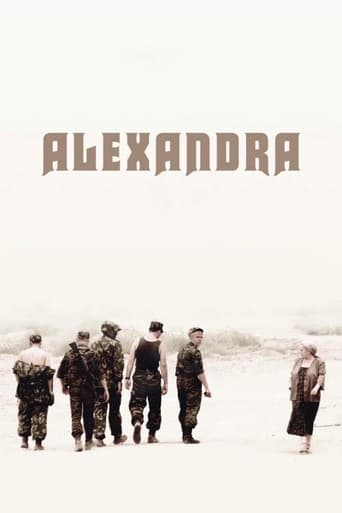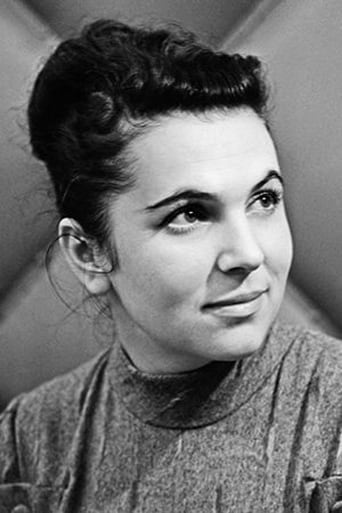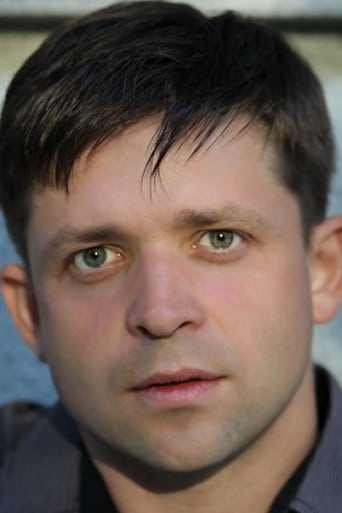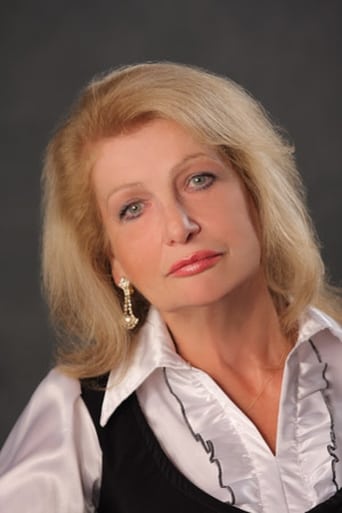Elderly Aleksandra visits her Russian soldier grandson, Denis, at the Chechen war front, providing comfort as she tours his army. All the while, Denis ponders the reason for her unexpected appearance.
Reviews
People are voting emotionally.
At first rather annoying in its heavy emphasis on reenactments, this movie ultimately proves fascinating, simply because the complicated, highly dramatic tale it tells still almost defies belief.
Blistering performances.
The film never slows down or bores, plunging from one harrowing sequence to the next.
Aleksandr Sokurov's "Aleksandra" depicts an elderly woman visiting her grandson on a military base in Chechnya. We don't see where the title character comes from, but we get a feeling of how this is a new world to her. In that sense, one might interpret the movie as a look at how our tendency to stay in comfort zones blinds us to the rest of the world."Aleksandra" is one of those deliberately slow-moving films; it takes time to get to know the characters. The cast is not anyone likely to be recognizable to non-Russian audiences, but that doesn't matter. The point is that this movie is not a political statement about the situation in Chechnya, it's merely a look at this one woman's exposure to this new world within her own country. Not a masterpiece, but I found it to be a good movie. Intense, but worth seeing.
Grandma Alexandra (Galina Vishnevskaya) looks very fed up. She's got the whole of Mother Russia on her back – so is needing to walk much Great Suffering out of her tired legs.She's gone to see Dennis (Dennis?!) her army officer grandson, where he's making war in the Chechen Republic. Whys she there? I mean, how credible is this? Why is she allowed to be there? Why is she allowed to wander around the front line faffing her fingers at the bored border guards? This situation seems like a contrived set-up of Sukurov's to facilely juxtapose women as nurturers against the bad boys (men) of war.It's soon turned into one of those films where questioning plot plausibility becomes irrelevant – cus there is no plot. Nothing very interesting happens. And nothing very interesting is said. She gets shown around the dusty hot base, the dirty combat vehicles. Now she's examining their shiny equipment. She's brusque, dismissive. Seen it all, done it all. "All" meaning all the suffering already. All the suffering these bored boys are too insensitive – or desensitized – to suffer, with all this impersonalised shooting off of these weapons of destruction they do.So she's wandering about the camp mumbling and muttering to herself like some grumpy old Mother Archetype. Its "Alexandra Nikolaevna" this and "Alexandra Nikolaevna" that (thought that only happened to characters in Tolstoy novels). Keeps needing to sit down cus tired. More than likely made tired; by the moral torpor shes witnessing – as accentuated by the drained out greeny gray the film is being filtered through."What do you actually want? I don't understand you" says Unit Commander. I don't understand her either. And its hard not to feel disengaged by all this gruff antipathy she's wearily trudging around the camp with. They can't help it – the poor lambs; they're just being soldiers. Making war and killing people is what soldiers do. Even if they are only little lads. If you don't like being there Gran – go away! And she's gone. Leaves as disgruntled/ crotchety/ lonely/dismayed(take your pick) as she came. Mind you, there's been a big granny love-in at the train departure; reinforcing how instantly, easily, connective womenfolk can be together. Because they – the grannies, (whether Russian or Chechen) represent humankind's best, possibly – only – hope against war (I doubt Sukurov meant anything as trite as that – but its as much thought as i want to give this film for now)
I don't know many grandmothers that would take a troop train across Russia, then get on top a troop transport to visit their grandson (Vasily Shevtsov), an Army Captain in Chechnya. But this grandmother (Galina Vishnevskaya) did. It was certainly an arduous journey for the elderly woman.The films color is appropriate for the hot and dirty climate where here grandson is stationed. The soldiers are all shirtless and just sit around waiting. The other soldiers watch her with fascination, probably thinking of home and their own grandmothers.She makes her way to the market where cigarettes are priced depending upon you rank. The locals look at the Russians with disgust. She manages to connect with a local, Malika (Raisa Gichaeva), who treats her like a sister.It is not a place for a grandmother, but she manages to connect again with her grandson before he goes off on a five-days mission, and she boards the troop train home.It was only anti-war in a subtle sense. The futility of it all was visible, but not exaggerated. Maybe the futility was finally recognized as the Russians are to leave Chechnya soon.A very good story.
In the 1976 comedy Love And Death, Woody Allen finds himself conscripted into the Russian Army about to fight Napoleon's invading French forces. While in basic training, a stern drill sergeant tries to explain the reality of things to the peasant soldiers who will soon shed their blood for Mother Russia.Drill Sergeant - If they kill more Russians, they win. If we kill more Frenchmen, we win.Woody What do we win?This line always gets a laugh (and would be well worth asking any time WE feel the need to go to war), so why did that question come to mind after seeing Alexander Sokurov's breathtaking film Alexandra? I'll come to that momentarily.Alexandra is a film of deceptive simplicity. An older grandmother comes to a remote military base to visit her 27-year-old grand son who is a captain. While there, she is treated as an honored guest, almost like a beloved mascot and she gets to meet many different soldier boys as well as some of the locals who live in the destroyed towns around the base.Described this way, it would be hard to justify to your friends why you want to see a film about an old Babushka groaning around a military base always complaining about the heat for 95 minutes, but then you are not considering the surprises in store from the great Russian director Alexander Sokurov who has been described as a Russian David Lynch, but I think this is mistaken.If you must pigeonhole Sokurov, he has more in common with Gus Van Sant in his experimental mode with films like Last Days, Elephant and the recent Paranoid Park. Like Van Sant, Sokurov's films have seemingly straightforward narratives, but are then made brilliant by an unconventional way of telling the actual story as well as a utilizing unique ways of manipulating sound and image.What ultimately happens if you allow yourself to be seduced by the film, is the whole thing becomes an allegorical examination of the Russian soul and a meditation on why they often find themselves in no-win situations like Chechnya, which Alexandra is clearly about.But there are many things that I, as an American may not appreciate fully. For example, the solemn type of poetic love that Russians have for their mothers that is evident in everything from their literature to their music to their theater, (Americans loves their mothers too, but it is a bit different).I also can't fully understand the helpless feeling they have of being a "former" world power that finds itself bogged down in a country it could have once blown right off the map, but can now do nothing. (Don't worry; America could get there yet if we don't stop these Neo-Con morons with their selfish pursuits disguised as patriotism.)Then there is the casting of the film. The soldiers are all well played by handsome young actors with sweet, youthful faces, but it is the solid presence of Galina Vishnevskaya as Alexandra that holds this film together. I have read she was a well-known opera singer in Russia and considered a national treasure, although I was not familiar with her before this film.Considering what Galina Vishnevskaya had to do; literally embody Mother Russia as a concept while never ever losing her humanity, her performance is wonderfully understated, yet never less than powerful and compelling.It won't happen, but if Daniel Day Lewis can get an Oscar for grossly over-playing an evil oilman in There Will Be Blood, I hope Galina Vishnevskaya can at least get an Oscar nomination for portraying the historical soul of a nation all the while making her human and understandable.It is rare that films ever tackle things allegorically. That is usually reserved for the theatrics of the stage or the interior realms of the mind in a novel. Even if it were something that could be done more often, most Americans would not accept it.The American style of story telling is straightforward and blunt; whereas allegory relies on symbolism, and a transubstantiation of ideas and concepts into dramatic characters and situations.To many people, this all feels like trickery and they remain closed off to the richness of allegory, especially in the arts. Yet, crazily enough, they have no trouble accepting it every Sunday in church where Christians by the thousands believe that ordinary wine and bread get turned into the Blood and Bone of Christ.It really doesn't happen folks, (except symbolically) or that would make you cannibals. So if you can accept that kind of symbolic allegory and transmutation of concepts in church, it requires only a little bit more imagination to accept it in a film. Please try. You don't know what you're missing.Getting back to my opening citation of Love And Death and why Alexandra made me think of it, well, at the end of the film, as Alexandra is on her way back home, she looks at the passing Chechen countryside through the door of her train.It is dry, hot, and pretty much a wasteland. Yet, this is the very land the Chechens are more than willing to die for and really, what possible use could it be for the Russians? I hope Alexandra is considering Woody Allen's surprisingly simple, yet devastating question, after all the terror, all the horror and all the killing is over, "What do we win?"It turns out the answer is rolling right past Alexandra's eyes, outside the train door.Nothing.
Top Streaming Movies


















